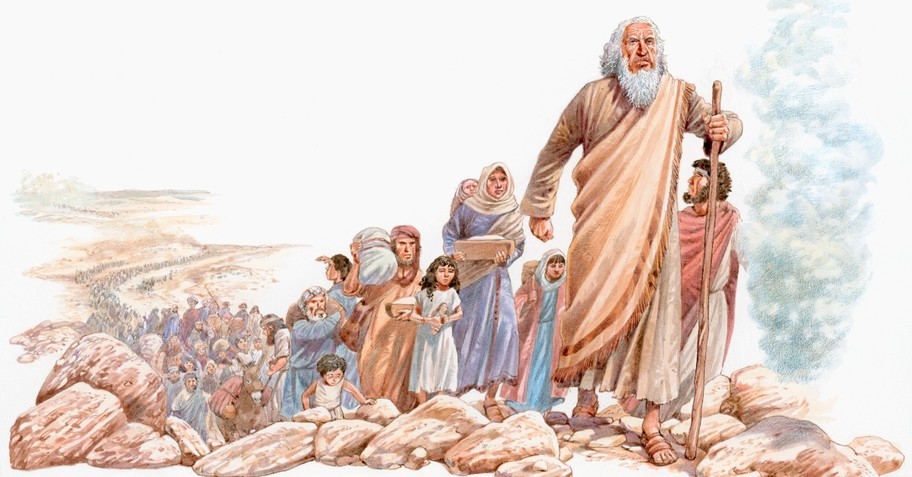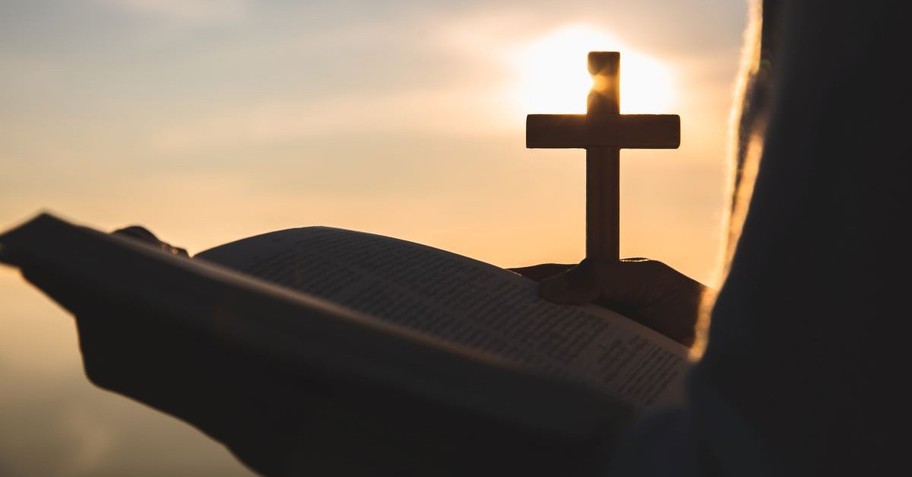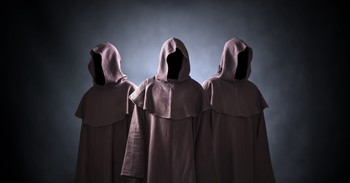Why Did God Give the Old Testament Law?

After Adam and Eve transgressed, they were driven out of the Garden of Eden, not as punishment but as mercy. Otherwise, they could have eaten from the Tree of Life and lived forever in their fallen state.
But the Spirit did not stop fellowshipping with them. True, they put a division between themselves and their Creator, but He was still talking to them. How else could they have known they needed to make sacrifices?
God asked Cain where his brother was after Abel’s death. Cain didn’t seem surprised to hear the voice of the Lord. This shows how communication was still a normal occurrence in their lives. Cain was protected with a mark so that others wouldn’t take vengeance on him for the murder he committed.
God didn’t leave Cain, but Cain left God.
So Cain went out from the Lord’s presence and lived in the land of Nod, east of Eden. (Genesis 4:16 NIV)
Humans deviated from the Almighty’s ways, yet retribution for their wrongdoing was not enacted against them. Except in the case of the flood and Sodom and Gomorrah, the Sovereign of the universe did not bring vengeance against the world at the beginning of time.
Photo Credit: ©Getty Images/ByczeStudio
Why Didn’t God Give the Law to Adam and Eve?
God didn’t turn His back on Adam and Eve and their offspring. Their closeness with Him was destroyed because they turned away from Him, not because He turned away from them. Intimacy was gone, but fellowship was not.
He told them about a holy Seed who would be punished for their sin (Genesis 3:15). The offerings they were instructed to make were to represent the One who would come, and their part was to put faith in Him.
But people fell into unrighteousness so deeply they didn’t even acknowledge they were sinning. Lamech thought if Cain got away with murder, he surely would get by with it because he killed a man out of self-defense (Genesis 4:24).
The population of the earth took it upon themselves to do whatever they wanted. They didn’t see anything as evil. Even though sin was killing them, they didn’t know they were transgressing.
To be sure, sin was in the world before the law was given, but sin is not charged against anyone’s account where there is no law. (Romans 5:13 NIV)
Even after the flood, the Lord still provided grace and mercy toward the subsequent generations. Wickedness became rampant again and God had to stop the degradation to keep it from spreading throughout the land too fast. Sodom and Gomorrah were judged and destroyed. He had to preserve humanity to have a virgin who could conceive the body of the only begotten Son.
Lot lived in this perverse land and his soul was vexed with what he witnessed. The Angel of the Lord saved Lot and his family by removing them before judgment fell.
The Lord’s character is love, mercy, and grace. His desire was for mankind to see the promise He made in Eden and for them to put faith in His redemption. Yet they took lack of punishment as approval for their wrongdoing. The inhabitants of the world still rebelled.

Why Did God Wait Until the Israelites Were in the Wilderness?
The Lord called Abram out of his homeland and later made a covenant with him (Genesis 12:1-3). The sign of this covenant was circumcision (Genesis 17). At this time, Abram became Abraham, the father of many nations.
This covenant was given before Jehovah ever gave the written Law to men. Abraham was counted as righteous because he believed God, thereby showing that the Law cannot save anyone.
The promise of a future redeemer that was laid out in the Garden could only be preserved by the Lord setting apart a society that would see their sinful ways and repent. They were to be a sign to other nations of who God Almighty was.
Four hundred years in Egypt had kept them in one place until they were grown into a nation. They lived in slavery and became numerous. The Holy One was ready to shape them into His representatives.
To set them apart, they needed to know what Heaven’s standard was. They had been surrounded by false gods in Egypt and would encounter more idols in the days ahead. They were to be holy. Israel would be the only nation on earth who served the living God.
Keeping the Law was so unattainable, the objective was to show people they couldn’t keep it. It was given so they would cry out to God for salvation.
Why, then, was the law given at all? It was added because of transgressions until the Seed to whom the promise referred had come. The law was given through angels and entrusted to a mediator. (Galatians 3:19)
We can see this in modern terms by looking at a speeding car. If there is no speed limit, there is no penalty for going too fast. However, going too fast can still kill a person. The car can exceed safe speeds without the driver being held accountable for it by getting a ticket or going to jail.
But the vehicle is still transgressing the laws of physics as the driver acts in ways that can get him or her killed or injured. Once a speed limit law is enacted, drivers will know if they transgress.
Photo Credit: ©Getty Images/Dorling Kindersley
What Is the Curse of the Law?
So, then, the law is holy, and the commandment is holy, righteous and good. Did that which is good, then, become death to me? By no means! Nevertheless, in order that sin might be recognized as sin, it used what is good to bring about my death, so that through the commandment sin might become utterly sinful. (Romans 7:12-13)
By the time the Messiah appeared, the Jews had lived under centuries of Law and had added to it with their own rules. They put confidence in their observances. They lost the meaning of why these commands were given.
Jesus exposed these wrong beliefs by showing them their heart.
“For I tell you that unless your righteousness surpasses that of the Pharisees and the teachers of the law, you will certainly not enter the kingdom of heaven. You have heard it said to the people long ago, ‘You shall not murder, and anyone who murders will be subject to judgement.’ But I tell you that anyone who is angry with a brother or sister will be subject to judgment.” (Matthew 5:20-22)
They had so deviated from knowing that Yahweh gave the Law to show them their sin and get them to trust Him, that the Law itself had become their god. Keeping the Law cannot make a person righteous.
Christ is the culmination of the law so that there may be righteousness for everyone who believes. (Romans 10:4)
The curse of the Law was that no one could keep it (Galatians 3:10-11). That’s the reason Christ came.
How Have We Adopted Law Keeping in the Church Today?
We don’t observe the Old Testament Law today, but we can still fall into the same mindset when we try to live according to our works. If we approach the Throne based on how much we read the Bible, go to church, give, visit, or witness, we do the same things the Pharisees did. This works-based mentality means we are dependent upon what we do to please God and not on what Jesus has already done.
Good works should be a fruit of our relationship with God, not a means to try to obtain His acceptance. Nothing we do can bring more affection to us from our Father.
The Word as flesh fulfilled the Law. Faith in what He did is what saves us. We are to rely on His holiness and not our works.

Does Grace Mean We Can Still Sin?
We are given grace through Christ. He took upon Himself the chastisement for sin. No more animal sacrifices and no more fear of wrath from the holy Judge.
This raises the question by some people, then if we won’t be punished anymore, why can’t we just sin as much as we want to?
God will still care for us and forgive us no matter what. But sin carries tremendous consequences. We will suffer for following our flesh. And continued evil behavior can harden our hearts toward the Spirit and keep us from hearing Him (Hebrews 3:13).
Don’t you know that when you offer yourselves to someone as obedient slaves, you are slaves of the one you obey—whether you are slaves to sin, which leads to death, or to obedience, which leads to righteousness? (Romans 6:16)
A person can sit in a jail cell after committing crimes and God will still love them. But the results of their actions against society will be implemented. Sin hurts people. Sexual immorality can bring diseases and break up families. Drug and alcohol abuse destroys bodies and relationships. Lying to others breaks trust. Covetousness plants the seed for stealing.
Therefore, brothers and sisters, we have an obligation—but it is not to the flesh, to live according to it. For if you live according to the flesh, you will die; but if by the Spirit you put to death the misdeeds of the body, you will live. (Romans 8:12-13)
If we have the deep revelation of how much the Father cherishes us, we will not want to violate that bond. We will be forever grateful for what the Savior did for us. If we approach grace as an opportunity to sin, we are abusing the cross of Christ.
The only law we are under now is the law of love (Romans 13:8-10). When we understand that we cannot be made holy by what we do, but only through the sacrifice of the Son, we are set free from the curse of the Law.
Christ redeemed us from the curse of the law by becoming a curse for us, for it is written: “Cursed is everyone who is hung on a pole.” He redeemed us in order that the blessing given to Abraham might come to the Gentiles through Christ Jesus, so that by faith we might receive the promise of the Spirit. (Galatians 3:13)
Our Creator’s original intention was for mankind to accept His love. But His heart was ignored, and misdeeds abounded. He had to show us that we were sinful so we would call out to Him in repentance.
We had to find out we couldn’t save ourselves. That’s why He sent us a Savior.
Photo Credit: ©GettyImages/Tinnakorn Jorruang
Originally published August 13, 2021.









